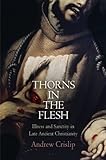Thorns in the Flesh : Illness and Sanctity in Late Ancient Christianity / Andrew Crislip.
Material type: TextSeries: Divinations: Rereading Late Ancient ReligionPublisher: Philadelphia : University of Pennsylvania Press, [2012]Copyright date: ©2013Description: 1 online resource (248 p.)Content type:
TextSeries: Divinations: Rereading Late Ancient ReligionPublisher: Philadelphia : University of Pennsylvania Press, [2012]Copyright date: ©2013Description: 1 online resource (248 p.)Content type: - 9780812244458
- 9780812207200
- Asceticism -- History -- Early church, ca. 30-600
- Diseases -- Religious aspects -- Christianity -- History of doctrines -- Early church, ca. 30-600
- Human body -- Religious aspects -- Christianity -- History of doctrines -- Early church, ca. 30-600
- Suffering -- Religious aspects -- Christianity -- History of doctrines -- Early church, ca. 30-600
- Religious Studies
- RELIGION / Christianity / History
- Ancient Studies
- Classics
- Religion
- Religious Studies
- 261.8 32109015 23
- BR195.S93 C75 2013eb
- online - DeGruyter
| Item type | Current library | Call number | URL | Status | Notes | Barcode | |
|---|---|---|---|---|---|---|---|
 eBook
eBook
|
Biblioteca "Angelicum" Pont. Univ. S.Tommaso d'Aquino Nuvola online | online - DeGruyter (Browse shelf(Opens below)) | Online access | Not for loan (Accesso limitato) | Accesso per gli utenti autorizzati / Access for authorized users | (dgr)9780812207200 |
Frontmatter -- Contents -- Introduction -- Chapter 1. Illness, Sanctity, and Asceticism in Antiquity: Approaches and Contexts -- Chapter 2. Asceticism, Health, and Christian Salvation History: Perspectives from the Earliest Monastic Sources -- Chapter 3. Paradise, Health, and the Hagiographical Imagination -- Chapter 4. Choosing Illness: Illness as Ascetic Practice -- Chapter 5. Pestilence and Sainthood: The Great Coptic Life of Our Father Pachomius -- Chapter 6. Illness and Spiritual Direction in Late Ancient Gaza: The Correspondence of Barsanuphius and John with the Sick Monk Andrew -- Conclusion -- Abbreviations -- Notes -- Works Cited -- Index -- Acknowledgments
restricted access online access with authorization star
http://purl.org/coar/access_right/c_16ec
The literature of late ancient Christianity is rich both in saints who lead lives of almost Edenic health and in saints who court and endure horrifying diseases. In such narratives, health and illness might signify the sanctity of the ascetic, or invite consideration of a broader theology of illness. In Thorns in the Flesh, Andrew Crislip draws on a wide range of texts from the fourth through sixth centuries that reflect persistent and contentious attempts to make sense of the illness of the ostensibly holy. These sources include Lives of Antony, Paul, Pachomius, and others; theological treatises by Basil of Caesarea and Evagrius of Pontus; and collections of correspondence from the period such as the Letters of Barsanuphius and John.Through close readings of these texts, Crislip shows how late ancient Christians complicated and critiqued hagiographical commonplaces and radically reinterpreted illness as a valuable mode for spiritual and ascetic practice. Illness need not point to sin or failure, he demonstrates, but might serve in itself as a potent form of spiritual practice that surpasses even the most strenuous of ascetic labors and opens up the sufferer to a more direct knowledge of the self and the divine. Crislip provides a fresh and nuanced look at the contentious and dynamic theology of illness that emerged in and around the ascetic and monastic cultures of the later Roman world.
Mode of access: Internet via World Wide Web.
In English.
Description based on online resource; title from PDF title page (publisher's Web site, viewed 08. Aug 2023)


